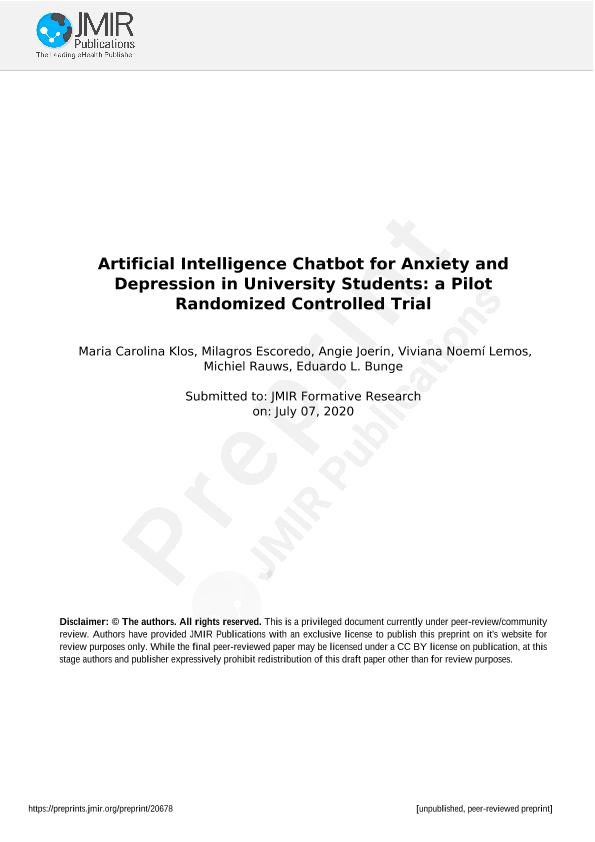Mostrar el registro sencillo del ítem
dc.contributor.author
Klos, María Carolina

dc.contributor.author
Escoredo, Milagros
dc.contributor.author
Joerin, Angie
dc.contributor.author
Lemos, Viviana Noemí

dc.contributor.author
Rauws, Michiel
dc.contributor.author
Bunge, Eduardo L.
dc.date.available
2021-08-17T19:45:36Z
dc.date.issued
2020-07
dc.identifier.citation
Klos, María Carolina; Escoredo, Milagros; Joerin, Angie; Lemos, Viviana Noemí; Rauws, Michiel; et al.; Artificial intelligence chatbot for anxiety and depression in university students: a pilot randomized controlled trial; JMIR Formative Research; Journal Of Medical Internet Research; 5; 8; 7-2020; 1-28
dc.identifier.uri
http://hdl.handle.net/11336/138394
dc.description.abstract
Background: The use of artificial intelligence based chatbots as an instrument of psychological intervention is emerging, however no studies have been reported in Latin America. Objective: The objective of the present study was to evaluate the viability, acceptability and potential impact of Tess, a chatbot, on symptoms of depression and anxiety in university students. Methodology: This was a pilot randomized controlled trial. The experimental condition used Tess for eight weeks and the control condition was assigned to a psychoeducation book on depression. Comparisons were conducted using Mann-Whitney U and Wilcoxon tests for depression symptoms, and Independent and Paired Samples t Tests to analyze anxiety symptoms. Results: The initial sample consisted of 181 Argentinian college students (87.2% female) ages 18 to33. A total of 39 (39%) participants in the experimental condition and 34 (41%) in the control group, provided data at week eight. There was an average of 472 (SD=249.52) messages exchanged and an average of 116 (SD=73.87) of the messages were sent from the user in response to Tess. A higher number of messages exchanged with Tess was associated with positive feedback (F2, 36=4.37; p =.02). No significant intergroup differences from baseline to week eight between the experimental group and the control group were found for depression and anxiety symptoms. However, significant intragroup differences demonstrated that the experimental group showed a significant decrease in anxiety symptoms; no differences were observed for the control group. No significant differences were found for depressive symptoms within the groups. Conclusions: Students engaged a considerable amount of time exchanging messages with Tess and positive feedback was associated with higher numbers of messages exchanged. The initial results show promising evidence for the usability and acceptability of Tess in the Argentinian population. Research on chatbots is still in its initial stages and further research is needed.
dc.format
application/pdf
dc.language.iso
eng
dc.publisher
JMIR Formative Research
dc.rights
info:eu-repo/semantics/openAccess
dc.rights.uri
https://creativecommons.org/licenses/by-nc-sa/2.5/ar/
dc.subject
ARTIFICIAL INTELLIGENCE
dc.subject
CHATBOTS
dc.subject
CONVERSATIONAL AGENTS
dc.subject
MENTAL HEALTH
dc.subject
ANXIETY
dc.subject
DEPRESSION
dc.subject
COLLEGE STUDENTS
dc.subject.classification
Psicología

dc.subject.classification
Psicología

dc.subject.classification
CIENCIAS SOCIALES

dc.title
Artificial intelligence chatbot for anxiety and depression in university students: a pilot randomized controlled trial
dc.type
info:eu-repo/semantics/article
dc.type
info:ar-repo/semantics/artículo
dc.type
info:eu-repo/semantics/publishedVersion
dc.date.updated
2021-07-01T17:46:51Z
dc.identifier.eissn
2561-326X
dc.journal.volume
5
dc.journal.number
8
dc.journal.pagination
1-28
dc.journal.pais
Canadá

dc.description.fil
Fil: Klos, María Carolina. Consejo Nacional de Investigaciones Científicas y Técnicas. Oficina de Coordinación Administrativa Saavedra 15. Centro Interdisciplinario de Investigaciones en Psicología Matemática y Experimental "Dr. Horacio J. A. Rimoldi". Grupo Vinculado CIIPME - Entre Ríos - Centro Interdisciplinario de Investigaciones en Psicología Matemática y Experimental "Dr. Horacio J. A. Rimoldi"; Argentina
dc.description.fil
Fil: Escoredo, Milagros. X2ai Inc.; Estados Unidos
dc.description.fil
Fil: Joerin, Angie. X2ai Inc.; Estados Unidos
dc.description.fil
Fil: Lemos, Viviana Noemí. Consejo Nacional de Investigaciones Científicas y Técnicas. Oficina de Coordinación Administrativa Saavedra 15. Centro Interdisciplinario de Investigaciones en Psicología Matemática y Experimental "Dr. Horacio J. A. Rimoldi". Grupo Vinculado CIIPME - Entre Ríos - Centro Interdisciplinario de Investigaciones en Psicología Matemática y Experimental "Dr. Horacio J. A. Rimoldi"; Argentina
dc.description.fil
Fil: Rauws, Michiel. X2ai Inc.; Estados Unidos
dc.description.fil
Fil: Bunge, Eduardo L.. Palo Alto University; Estados Unidos
dc.journal.title
Journal Of Medical Internet Research

dc.relation.alternativeid
info:eu-repo/semantics/altIdentifier/url/https://preprints.jmir.org/preprint/20678/accepted
dc.relation.alternativeid
info:eu-repo/semantics/altIdentifier/doi/http://dx.doi.org/10.2196/20678
Archivos asociados
